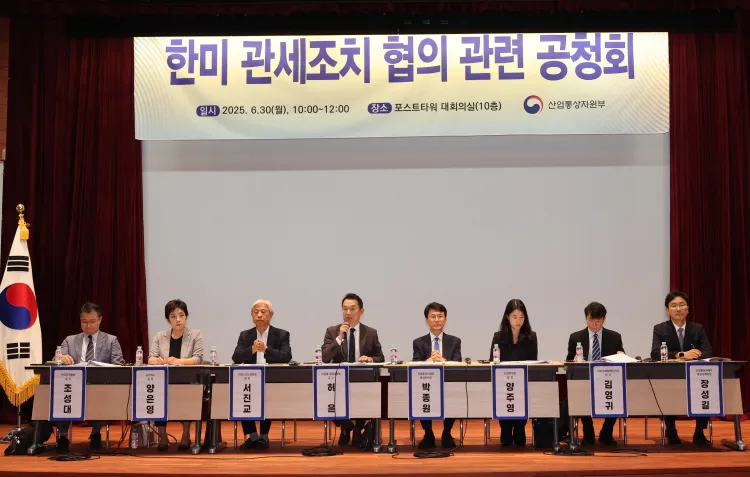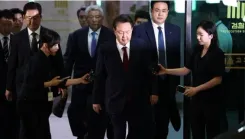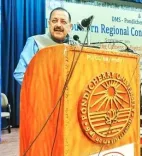How Will US Tariff Measures Affect the South Korean Economy?

Synopsis
Key Takeaways
- US tariffs could harm South Korea's exports.
- Access to the US market is vital for Korean industries.
- Negotiations must prioritize national interests.
- Trade surplus and non-tariff measures are key discussion points.
- Public input will shape negotiation strategies.
Seoul, June 30 (NationPress) The sweeping tariff policies introduced by US President Donald Trump are projected to significantly affect the South Korean economy, jeopardizing exports and the business stability of Korean enterprises, according to trade experts on Monday. They are urging the Seoul government to engage in proactive negotiations with Washington.
Concerns regarding the Trump administration's tariff measures were voiced during a public hearing aimed at gathering feedback on Seoul's potential negotiation strategy before entering into comprehensive tariff discussions with the US.
This public hearing was conducted as part of the necessary procedures for signing a trade agreement under the Act on the Conclusion Procedure and Implementation of Commercial Treaties, as reported by the Ministry of Trade, Industry and Energy.
"The hefty tariff measures imposed by the US could cause structural damage to Korean industries, leading not only to a decline in exports," said Yang Joo-young, the director of the office for economic security and trade strategy research at the Korea Institute for Industrial Economics & Trade.
"With the US accounting for over 18 percent of South Korea's exports, the survival of key sectors such as automobiles, semiconductors, batteries, and machine equipment is intricately linked to access to the US market," she elaborated.
Yang emphasized that market access will be crucial for Korea's position in the global technology competition and ongoing supply chain adjustments, urging the government to pursue not only tariff exemptions but also to enhance bilateral industrial cooperation in vital sectors such as defense, shipbuilding, and energy during trade negotiations.
A feasibility analysis conducted by the Korea Institute for International Economic Policy (KIEP) indicates that South Korea's gross domestic product could decline by 0.3 to 0.4 percent if the US tariff measures, including those yet to be implemented, come into full effect.
The Trump administration has already imposed 50 percent duties on all steel imports and 25 percent tariffs on imported vehicles, with plans to introduce substantial tariffs on semiconductor and pharmaceutical imports soon.
However, Kim Young-gui, a senior research fellow at the KIEP, stated that if Seoul successfully negotiates a deal with Washington similar to those made with Britain and China, the nation could mitigate some of the anticipated export losses.
Concerns from the agricultural and livestock sectors also surfaced regarding Washington's reported demand for Seoul to eliminate agricultural regulations, such as the import ban on US beef from cattle older than 30 months.
"The issue surrounding cattle age is particularly sensitive in Korea, and even initiating discussions could lead to considerable political and social backlash," noted Suh Jin-kyo, president of the GS&J Institute.
He added, "There are worries that lifting the cattle age restriction could exacerbate negative perceptions of US beef among Korean consumers, potentially resulting in a drop in current US beef exports to Korea."
In response, Chang Sung-gil, the trade policy director at the industry ministry, highlighted that during trade discussions with Washington, the Korean government emphasizes that the US faced a $66 billion trade deficit in goods with Korea last year, while consistently enjoying annual surpluses in the service and agricultural sectors.
"The US benefits from preferential treatment in the Korean market for its agricultural products under the bilateral free trade agreement," Chang added, assuring that the government would carefully consider the sensitivity of these issues in its negotiation strategy.
The Seoul government has been engaged in trade discussions with the Trump administration for several months, aiming to finalize a package deal by July 8, when the 90-day pause on US reciprocal tariffs is set to expire.
South Korea is striving to secure a complete exemption or reduction of the Trump administration's 25 percent reciprocal tariffs, as well as sectoral tariffs on steel, automobiles, and other imports.
The two parties have been exploring various measures to decrease Korea's significant trade surplus with the US and address what Washington claims are South Korea's non-tariff measures, which include proposed regulations for online platforms and restrictions on the export of high-precision location data, according to sources close to the situation.
Seoul "will approach tariff negotiations with the US based on the principle of prioritizing national interests," stated Vice Trade Minister Park Jong-won.
The government intends to thoroughly review the feedback gathered during the public hearing and incorporate it into its negotiation strategy before embarking on comprehensive trade discussions with the US, as per the ministry.









